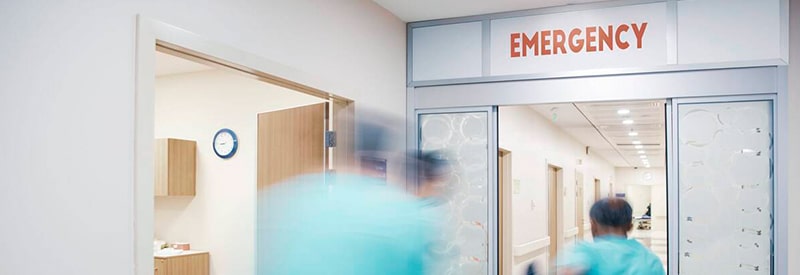
Emergency care in Henderson, TX
When there’s an emergency, you deserve fast, effective emergency medical care. UT Health Henderson offers urgent medical services around the clock, every day of the year. Our team stands ready to provide comprehensive emergency room (ER) services for you at a moment’s notice. Our 24/7 emergency hospital is equipped to respond to any type of medical emergency – from the most serious life-threatening cases like stroke and heart attack down to broken bones, severe infections, and lacerations. We have served thousands of patients and will continue offering expert care for years to come.
Emergency conditions we treat
Our emergency room is fully equipped and prepared to handle a broad range of medical crises, both minor and major, thanks to facilities like radiology, diagnostic testing, in-house labs, neurosurgery, intensive care, and both surgical and cardiac care. Our ER team is skilled in addressing various urgent health issues, such as:
- Breathing difficulties: This includes conditions like asthma flare-ups, serious allergic reactions, and cases of pulmonary embolism.
- Burns: Urgent attention is needed for burns that are deep, cover a large area, or affect sensitive regions like the face, hands, feet, or genitals.
- Dehydration or heat stroke: Indicators of heat stroke include excessive thirst, no urine output, or changes in mental state.
- Fractures and major sprains: These conditions are especially concerning if there’s noticeable distortion, intense pain, numbness, or loss of function in the affected area.
- Heart attack symptoms: This includes chest discomfort, difficulty breathing, and pain in other upper body areas.
- High fever: High fevers are particularly critical in babies, young children, the elderly, or those with compromised immune systems.
- Intense headaches/migraines: If your headache starts suddenly, is extremely painful, or comes with symptoms like vision changes or neck stiffness, visit an ER.
- Mental health crises: This includes thoughts or acts of suicide or harming others, extreme panic attacks, or episodes of psychosis.
- Obstetric complications: This can include significant bleeding during pregnancy, intense abdominal pain, or indications of early labor.
- Poisoning or overdose: This may involve the accidental intake of harmful substances or misuse of medications, whether prescription or over-the-counter.
- Seizures: Especially if it’s a first occurrence, or the seizures are frequent or prolonged, patients should visit an ER.
- Severe abdominal pain: This includes pain that could signal conditions like appendicitis, abdominal aneurysms, or other critical issues.
- Serious infections: Examples include sepsis, severe pneumonia, and critical urinary tract infections.
- Stroke symptoms: This includes sudden weakness or numbness in part of the body, confusion, speech difficulties, vision issues, or loss of balance or coordination.
- Trauma or severe injuries: Injuries resulting from car accidents, falls, or major head trauma should be addressed at an ER.
- Uncontrolled bleeding: This includes situations where bleeding persists despite 10 minutes of direct pressure.
If you or someone you know is experiencing any of these symptoms or conditions, please dial 911 immediately.
Our emergency room services
The UT Health Henderson emergency room physicians are equipped to treat a wide range of conditions and illnesses. Features of our ER include:
- Diagnostic services featuring x-ray, ultrasound, CT with iDose radiation reduction and other imaging modalities when needed
- Emergency room nurses with Trauma Nursing Core Course (TNCC) and Emergency Nursing Pediatric Course (ENPC)
- Laboratory services on-site
- Level III stoke support facility designated by the Texas Department of State Health Services
- Private treatment rooms
- The ability to monitor and stabilize heart attack and stroke patients
- Transfer to UT Health Tyler Level 1 Trauma Center, if a higher level of care is needed
Once you arrive at our ER, a specially trained triage nurse will assess you and determine the severity of your condition and in what order you will be treated. Patients who are critically ill or seriously injured are treated first, regardless of their time of arrival. Some patients may bypass the triage process. In these circumstances we appreciate your cooperation.

